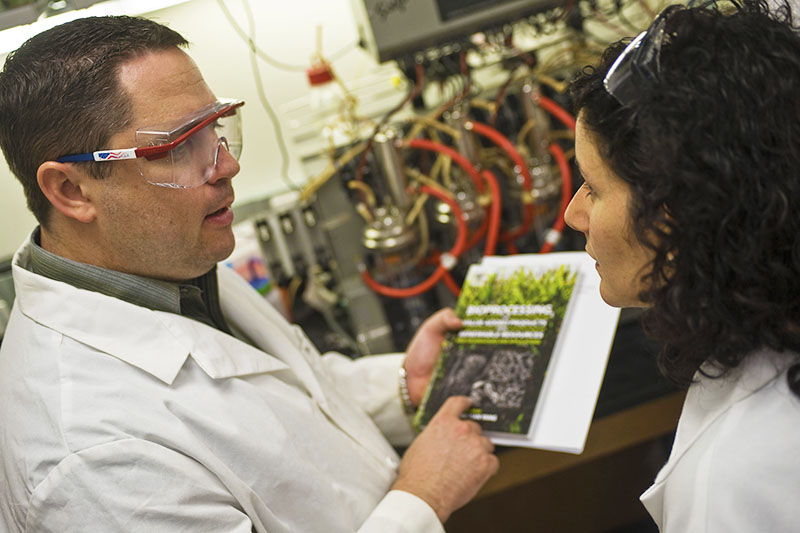
Q&A with REMOTE Program Director, Dr. Ramon Gonzalez
Photo Credit: Jeff Fitlow / Rice University
Dr. Ramon Gonzalez of ARPA-E discusses the REMOTE program and its innovative approach to methane conversion.
Please tell us about your background and experience before coming to ARPA-E.
My postdoctoral research is in the emerging field of “metabolic engineering.” This type of engineering leverages the metabolism of microorganisms to make them do something we want them to, that they otherwise wouldn’t do in nature. I started my career in academia at Iowa State University which, at the time, was one of the few places interested in renewable energy biomass-related conversions. I eventually moved to Rice University in Houston about 8 years ago where I started a lab for Metabolic Engineering and Synthetic & Systems Biology. Around the same time, I also started a company called Glycos Biotechnologies which focuses on the production of chemicals through fermentation of glycerol, an abundant and inexpensive carbon source. This gave me a lot of exposure to more entrepreneurial activities and commercialization of biotechnology.
Why did you decide to come to ARPA-E?
When I learned about ARPA-E, it felt like the perfect fit considering my mixed background of academia, R&D and entrepreneurial activities. In fact, developing a program at ARPA-E is a lot like building a startup, but at a much larger scale.
Can you describe your experience so far as a Program Director at ARPA-E?
ARPA-E has been a great experience; the environment is stimulating and rewarding. The agency has the ideal combination of practical technologists and out of the box thinkers. People here understand which projects have the potential to be both technologically transformative and disruptive in the marketplace.
Can you tell us a bit more about REMOTE and what the program is trying to do?
REMOTE is about the “bioconversion” of methane, the primary component of natural gas, into a fuel that is a liquid at room temperature. Bioconversion uses microorganisms to change organic chemicals into another form. The aim is to do so cost effectively and with a carbon footprint equal to or better than that of conventional fuels. Although gas-to-liquid technologies currently exist, they require high capital expenditures as well as massive and immobile rigs. The few technologies that can be deployed on a small scale are energy inefficient and emit a lot of carbon dioxide. By contrast, the bioconversion processes we’re considering can be deployed on a small scale with much lower capital expenditure requirements. Better still, they have the potential to be carbon neutral.
Why are there three different project categories within the REMOTE program?
Gas-to-liquid bioconversion is complex and challenging. I wanted to frame the problem in such a way so that projects could conquer individual challenges rather than attempting to tackle the entire process from start to finish. The first two project categories deal with 1: the initial activation of methane (making the CH bond in methane reactive), and 2: the subsequent synthesis of liquid fuels. The third category is focused on process intensification, creating a container that can hasten the reactions in the first two categories. Successes in any of these three categories will be a huge step forward, and across the board would be truly groundbreaking.
How is REMOTE different from some of the earlier biofuel programs?
REMOTE falls under the heading of “conversion processes” like to Electrofuel projects that take carbon dioxide gas and converts it to liquid fuel. However, that’s where the similarities end. Carbon dioxide has no inherent energy, whereas the methane in natural gas is energy-rich. REMOTE is special because it takes natural gas, an abundant domestic “feedstock,” and converts it to a usable fuel for today’s vehicles without the introduction of additional energy or the emission of carbon dioxide.
What are the prospects for commercialization of any projects in this program?
Commercialization is extremely promising. Activating the carbon-hydrogen bond in methane has the potential to be highly transformative. There is much evidence that it can be done, but previous approaches haven’t yielded any advancements. If we succeed, the market is already there for these solutions. We won’t have to push it or make a case for it. The industry is already intently waiting for these advancements.
What gets you personally excited about REMOTE and why should others be excited?
Petroleum is the primary source of transportation fuel in the US, so we’re forced to heavily rely on imports. If REMOTE is successful, we could drastically reduce the amount of petroleum used each year as a country, transitioning to a domestically-sourced natural gas-based infrastructure. This would be truly transformative, offering a legitimate path to energy independence, and making a considerable dent in the trade deficit.
As of 2016: For a detailed assessment of the REMOTE LanzaTec team's project and impact, please click here.
